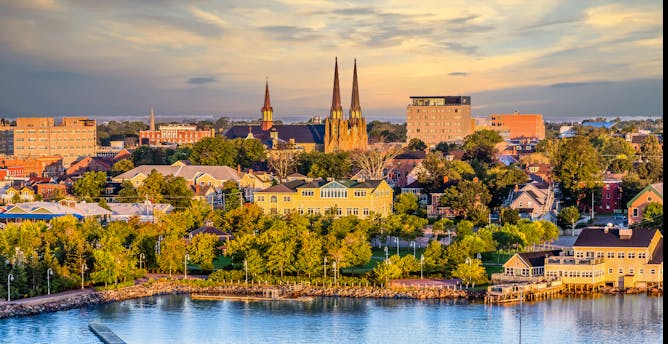|
Passenger pigeons once numbered in the billions. In the mid-1800s, they formed massive clouds across the skies of eastern North America and the beating of their wings was so loud they were sometimes mistaken for herds of horses stampeding through the boreal forest. At the time, they were probably the most abundant bird in North America, if not the world.
But they were hunted incessantly and the forests they foraged from were destroyed. By the late 1800s, the once abundant bird was rare. Wild flocks of passenger pigeons disappeared until there was only one left: A lone bird named Martha who lived in captivity at the Cincinnati Zoological Gardens. On Sept. 1, 1914, she died.
For more than a century, scientists debated the cause of the birds' demise. Humans were most certainly responsible, but it’s never been clear if it was the unchecked hunting or the forest destruction that led to their extinction. Today in The Conversation Canada, Eric Guiry from Trent University writes about the chemical analyses he and his group have done on the bones of passenger pigeons that lived between 900 and 1900. Their research sheds light on the mystery of what killed off the passenger pigeon.
Also today:
|

A passenger pigeon flock being hunted in Louisiana. From the ‘Illustrated Shooting and Dramatic News’, 1875.
(Wikimedia/Smith Bennett)
Eric Guiry, Trent University
For decades, the extinction of passenger pigeons has been explained by two theories of human impact. New research shows one of these theories is now more compelling than the other.
|

Incarcerated people are often denied access to treatment for opioid use disorder. This October 2016 file photo shows corrections officer opening the door to a cell in the segregation unit at the Fraser Valley Institution for Women in Abbotsford, B.C. during a media tour.
THE CANADIAN PRESS/Darryl Dyck
Claire Bodkin, McMaster University; Matthew Bonn, Dalhousie University; Sheila Wildeman, Dalhousie University
Urgently needed treatment for opioid use disorder is often denied to incarcerated people, feeding the crisis in prisons and jails.
|

People in Atlantic Canada cities, including Charlottetown, are nervous about rising house prices as young people return and immigration fuels economic growth.
(Shutterstock)
Howard Ramos, Dalhousie University; Emma Kay, Dalhousie University
In Atlantic Canada, leaders must avoid the mistakes made in the country’s largest cities where people are being pushed out due to high housing prices.
|

Although the United Nations has raised concerns about the rights of children, advocates say a baby hatch, like the one shown here in Karlsruhe, Germany, can save lives.
(Hardt Foundation)
Alana Cattapan, University of Waterloo
Since an infant was found in a recycling bin last fall in Saskatoon, advocates have renewed their campaign for baby hatches, places mothers can leave newborns safely and anonymously.
|

Une étude récente a révélé une variété de façons surprenantes dont les gens utilisaient Tinder dans leur vie.
Shutterstock
Stefanie Duguay, Concordia University
Tinder est un écosystème social où coexistent de multiples activités -sociales, politiques ou économiques- qui vont bien au-delà des simples rencontres.
|

Passage d'un train construit par Bombardier, dans une station de métro montréalaise. Le sous-investissement du Canada dans ses infrastructures de transport a nui à Bombardier.
Shutterstock
Klaus Meyer, Western University
La construction d'infrastructures prend du temps. Pour développer le transport durable, le Canada doit investir dans des infrastructures de haute qualité et respectueuses de l'environnement.
|
Health + Medicine
|
-
Brian Labus, University of Nevada, Las Vegas
What can you do to keep yourself and your family safe from the coronavirus? A public health scholar explains antiseptics – and emphasizes the importance of good hand-washing.
|
|
Politics
|
-
Robert Shrum, University of Southern California – Dornsife College of Letters, Arts and Sciences
Joe Biden's swift return as a strong candidate for the Democratic presidential nomination was a dramatic shift never seen before in the modern history of Democratic presidential primaries.
|
|
Education
|
-
Peter Ellerton, The University of Queensland
An academic should be able to use "I" in an essay which offers their point of view. In this way, they take responsibility for their argument.
|
|